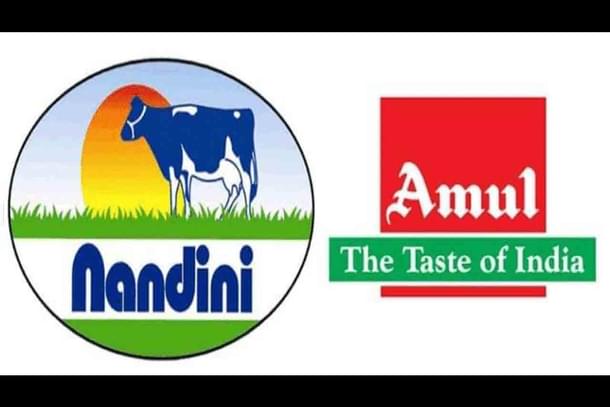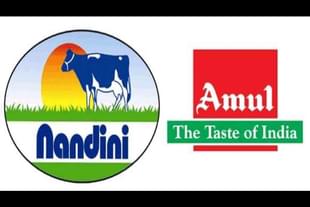News Brief
Karnataka: Amul Vs Nandini Controversy Smacks Of Economic Ignorance And Reeks Of Political Propaganda
Business Briefs
Apr 13, 2023, 06:52 AM | Updated 10:15 AM IST
Save & read from anywhere!
Bookmark stories for easy access on any device or the Swarajya app.


The opposition in Karnataka has created a controversy over the entry of the Gujarat Cooperative Milk Marketing Federation's (GCMMF's) Amul brand in the Bengaluru market through quick commerce platforms.
The opposition has alleged that the entry of Amul into the Bengaluru market could adversely affect the Nandini brand owned by the Karnataka Milk Federation. As if on cue, a section of Bruhat Bengaluru Hotels Association said it would boycott Amul products and only use Nandini products from here on.
The sudden opposition of Amul in the run-up to an election makes the episode appear politically motivated. Numbers, too, do not support the potential threat the opposition talks about.
Amul is Uncompetitive in Karnataka
Amul already sells its products in two districts in Karnataka and entered the market in 2015-16, when the opposition Congress was in power.
Amul will only be selling online and has said that it has "absolutely" no plans for a full-fledged expansion into the market. It is quite likely that Amul doesn't see Karnataka as a major market.
One of the main reasons for Amul's lack of growth in the Karnataka market is that it is simply uncompetitive against Nandini.
In September 2008, the BJP government under former Chief Minister BS Yediyurappa unveiled a support scheme through which an incentive of Rs 2 per litre is paid to farmers supplying milk to the KMF-affiliated district unions, over and above the latter's procurement price. In November 2019, when Yediyurappa returned as the CM, he hiked again to Rs 6/litre
Karnataka Milk Federation (KMF) can procure milk at a low rate since it pays only a part of the milk's total cost, and the government foots the rest of the bill. Hence, it can procure milk at a lower price and sell it to customers at a lower price – making Nandini's products more than 20 per cent cheaper compared to Amul's.
Nandini's orange milk costs Rs 43 a litre, compared to Rs 54 per litre for Amul. Similarly, curd sold under the Nandini brand is nearly 40 per cent cheaper than Amul's curd. Though these comparisons are made with Amul's prices in Delhi, the price difference doesn't vary much even in Amul's home turf Gujarat.
It is obvious that KMF derives significant benefits through subsidies. If two players offer a similar quality of product, the price will be the determining factor during the customers' purchases, giving Nandini a distinct advantage over any other brand in the market.
Nandini's strong brand, a strong distribution network in Karnataka, combined with its lower price, makes it the obvious choice for the average customer.
Quick Commerce Market Isn't a Large Enough to Threaten Nandini
Secondly, Amul's product will only be sold through e-commerce/quick commerce platforms, which cater to a small urban audience.
Bengaluru makes up only 20 per cent of Karnataka's population, and even then quick commerce platforms are only used frequently by a small fraction of the urban population.
Blinkit and Zepto have around a crore downloads each on Play Store from across India and are quite likely to have a significant overlap.
Blinkit has also said that the average ordering frequency on its platform is 3.5 times a month per customer, whereas buying milk or curd is a significantly more frequent activity in Indian households (almost daily in some cases).
Since milk and milk products in India are primarily sold through offline channels, Amul is unlikely to dent Nandini's sales with its online-only strategy.
Some have highlighted that Amul displaced the local milk federations in states like Maharashtra. But, Maharashtra does not provide heavy subsidies to milk farmers like Karnataka does, and Mahanand (Maharashtra's milk federation's brand) appears to be costlier by a rupee across products when compared with Amul. In such a scenario, it is only logical that Amul ends up doing better than the local milk federation. Comparing Maharashtra's situation with the current market situation in Karnataka is clearly unfair.
Overall, the numbers indicate that Amul won't cause any trouble for Nandini. The arguments provided by the opposition do not appear to have much merit.





